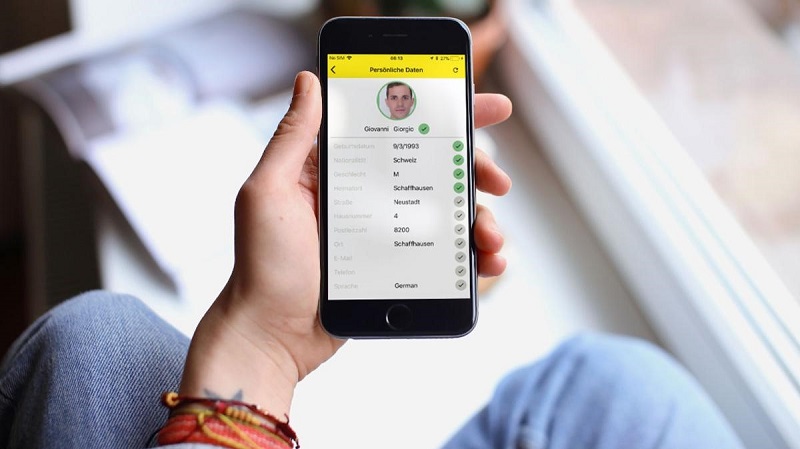It’s a strong signal for companies and individuals alike: lean administrative processes. In other words: transparent, fast and user-friendly. The canton of Schaffhausen switched from piloting digital identities to using them in May 2018. In the city of Zug, this took place in autumn 2018. In both cases, specialised private companies were brought on board to help out, but with clear limits: when it comes to certification, the canton and city are fully in charge, and when it comes to data, absolute autonomy is with the users. For the latter, the complex infrastructure is actually quite simple: you download the app, register your data in person with the authorities, and then without any further steps you have access to the digital services. It just so happens that the two trailblazing projects are not in competition with each other because they focus on different areas.
Opportunities for the economy
The project in Schaffhausen, called eID+, is designed to offer wide-ranging access to a fast-growing number of government processes. Released by KSD, an IT firm operated by the canton and city of Schaffhausen, it was developed into a smartphone solution by the Swiss electronic ID (eID) company Procivis.
First, companies can integrate eID+ into their services, such as banks that want to make it easy for customers to digitally open bank accounts. Discussions are underway with various companies. Second, eID+ reduces administrative efforts for the economy itself by shortening or outright eliminating certain processes. Lastly, it makes it possible to set up a company – fully electronically. But it’s not enough to have airtight technical solutions: “All processes are being revised and this triggers a far-reaching cultural change,” says Fleck.

Zug boasts world’s first ID on blockchain
In Zug, those developing the digital ID looked to blockchain, something that fits perfectly with the region’s international reputation as Crypto Valley. It’s therefore no surprise that Zug became the first city in the world to adopt a digital identity based on blockchain. Here, too, processes are meant to become more transparent and efficient, but there’s more: the city also wants to establish itself as a reliable innovation partner. It all began when the company uPort from Zug, the Lucerne University of Applied Sciences and Arts, and the Zurich-based company ti&m were looking for partners to implement a digital identity. As Zug’s town clerk Martin Würmli explains: “After our experiences with the acceptance of Bitcoin, we did not hesitate for long. Finally, we’re of the opinion that identity management is the role of the state.” According to Würmli, the city regards itself as part of the region’s innovative ecosystem, and it wants to gain and facilitate new experiences as an open administration.
For example, the data of participating persons are now stored in a kind of digital locker on the uPort app, which itself is linked to a unique crypto-address on the Ethereum blockchain that cannot be tampered with. With the help of this forgery-proof identity, around 300 users in Zug can already rent bicycles. What’s more, a blockchain-based vote has already been held, which has the potential to shape e-voting in the future. Says Würmli: “We are working on new services ourselves, and our doors are open to ideas for using the digital ID.”
Innovation overcomes borders
Schaffhausen is also thinking along the lines of blockchain for certain services and sees its potential, although the focus is different. The trailblazers in Zug are in contact with those in Schaffhausen, comparing experiences while always keeping data security front and centre of everything they do. Because in the Greater Zurich Area, the innovative ecosystem doesn’t end at municipal or cantonal borders: it is instead focused on overcoming them altogether.
By Yvonne von Hunnius
More News
Contact us
Can we put you in touch with a peer company or research institute? Do you need any information regarding your strategic expansion to Switzerland's technology and business center?
info@greaterzuricharea.com